Unit 7Teenagers should be allowed to choose their own clothes.
2024-09-05
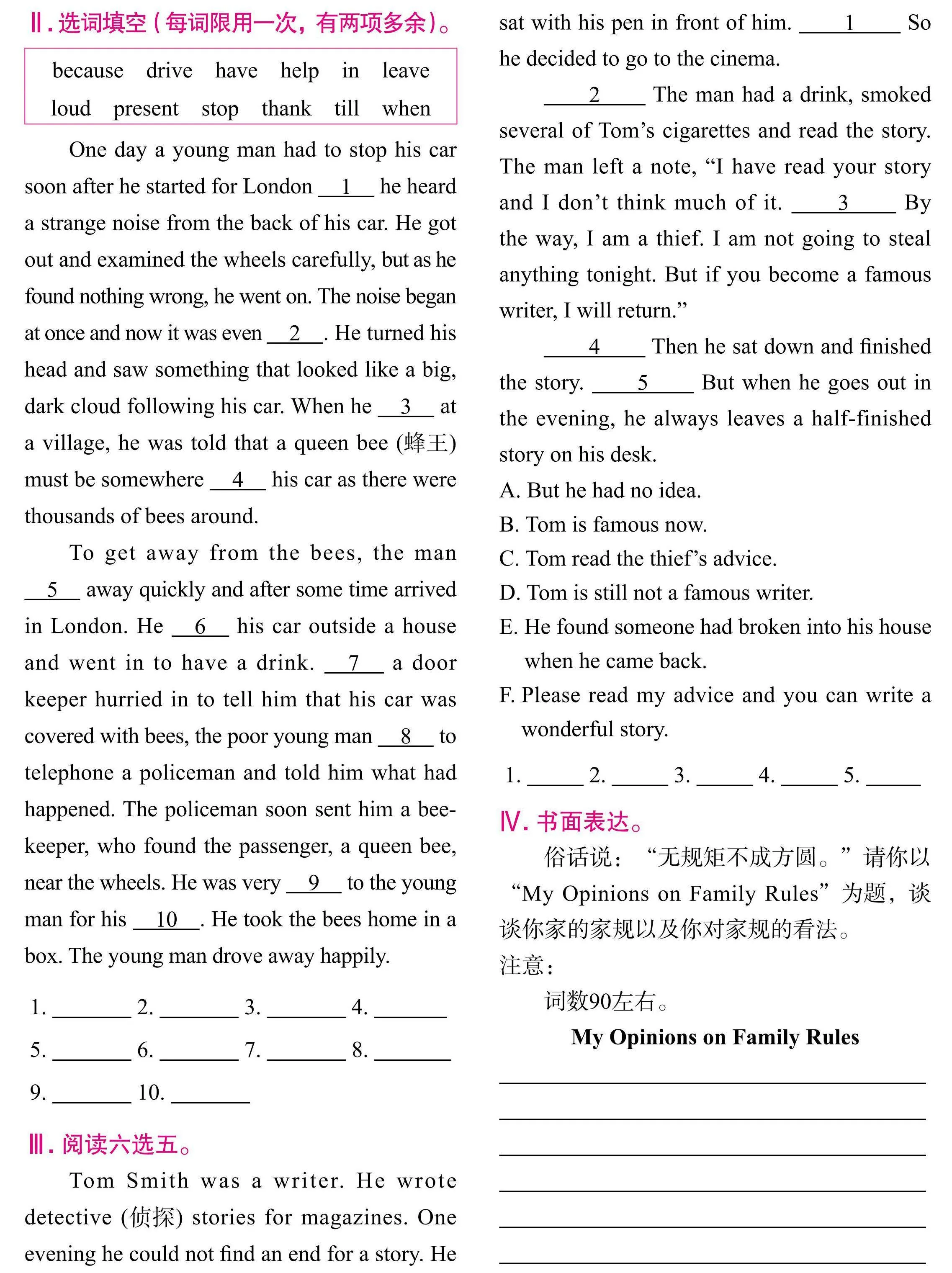
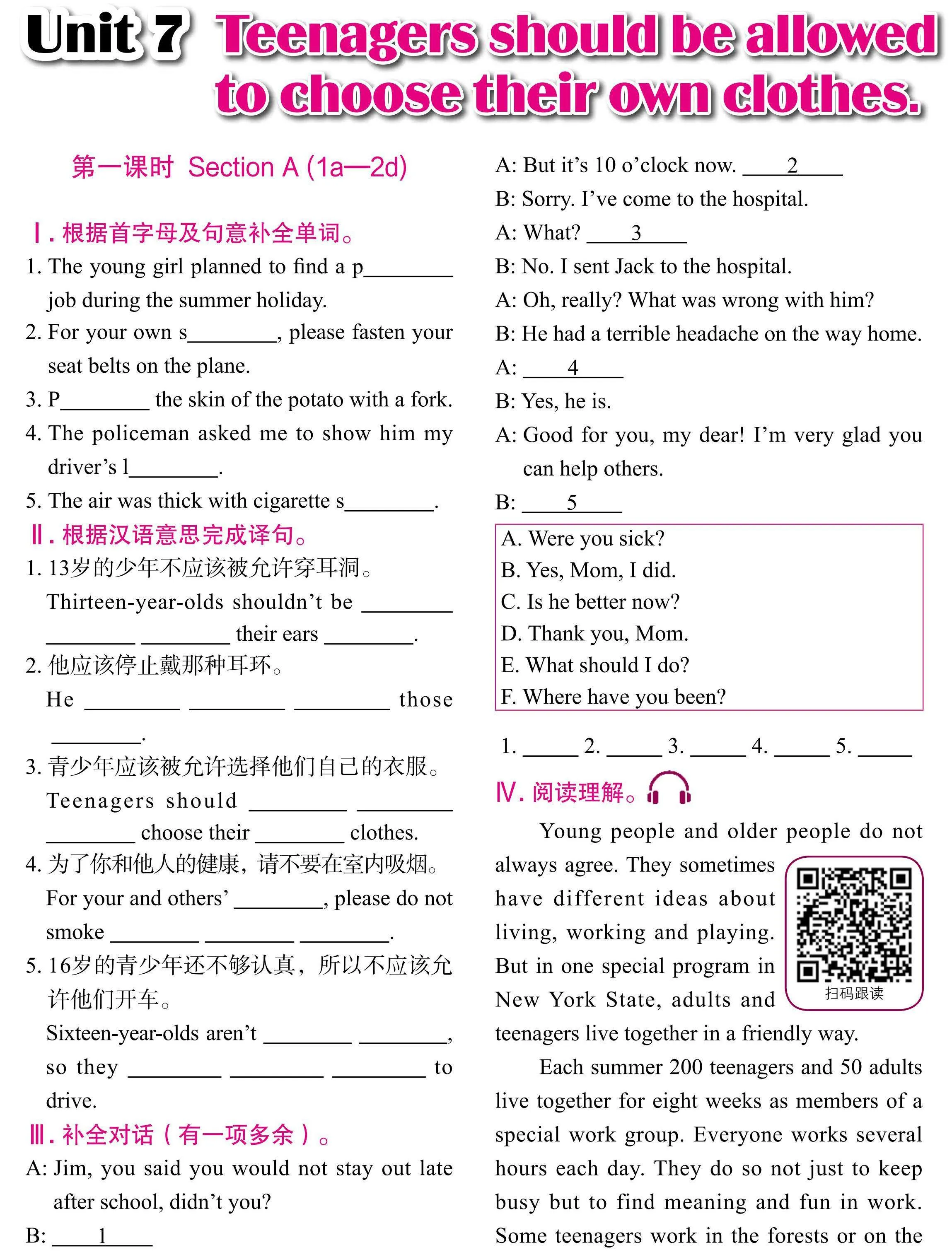
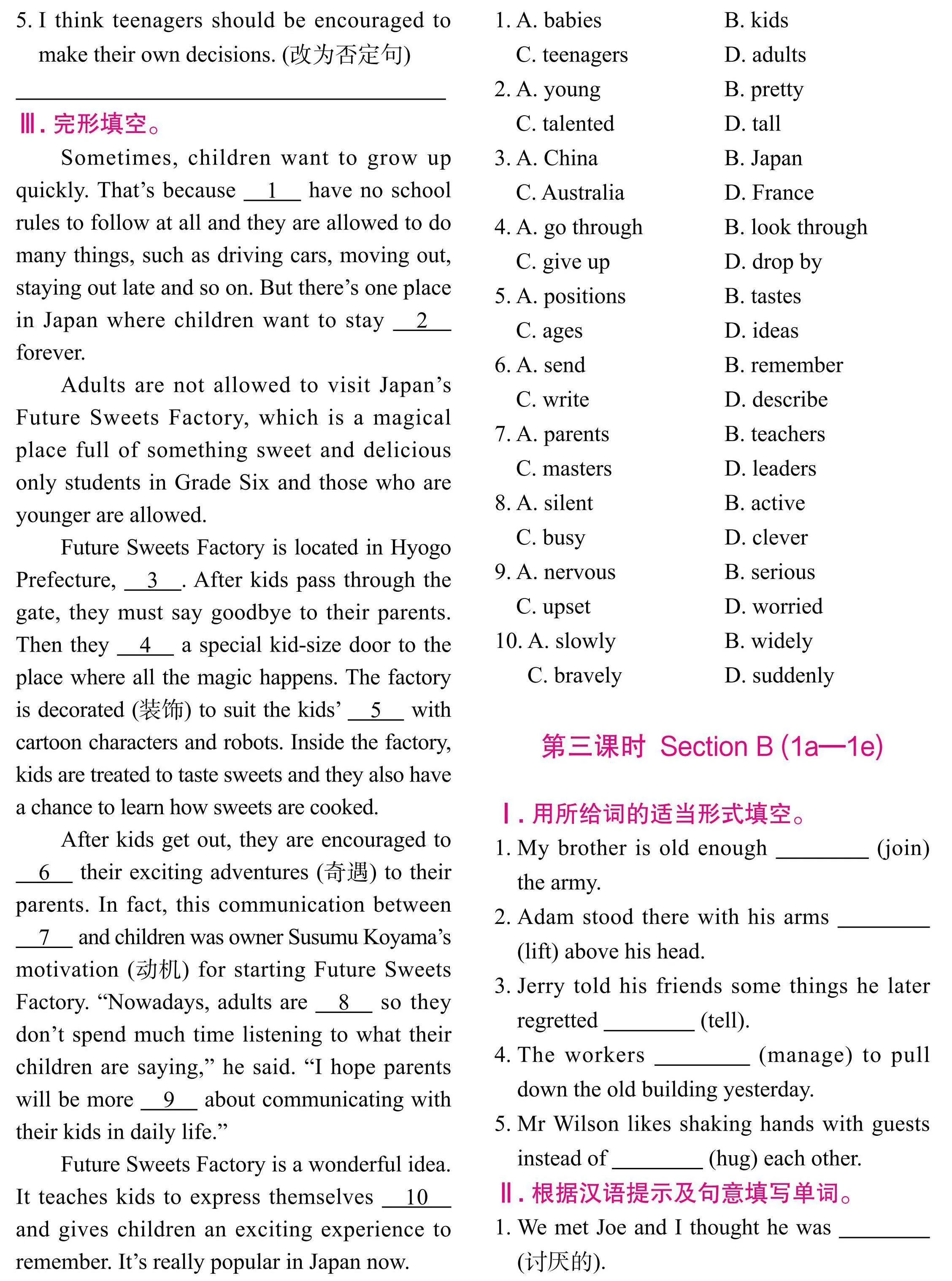
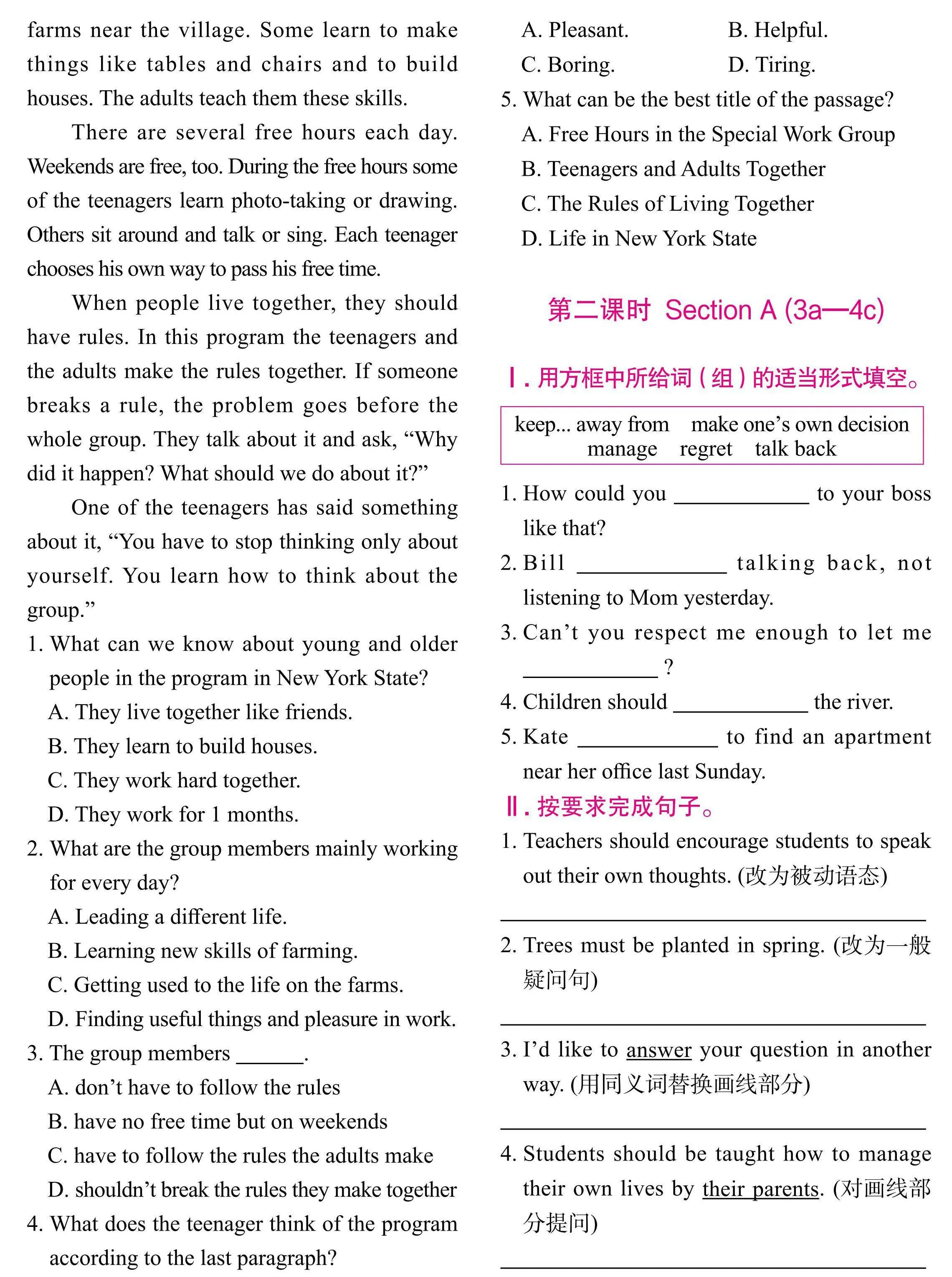
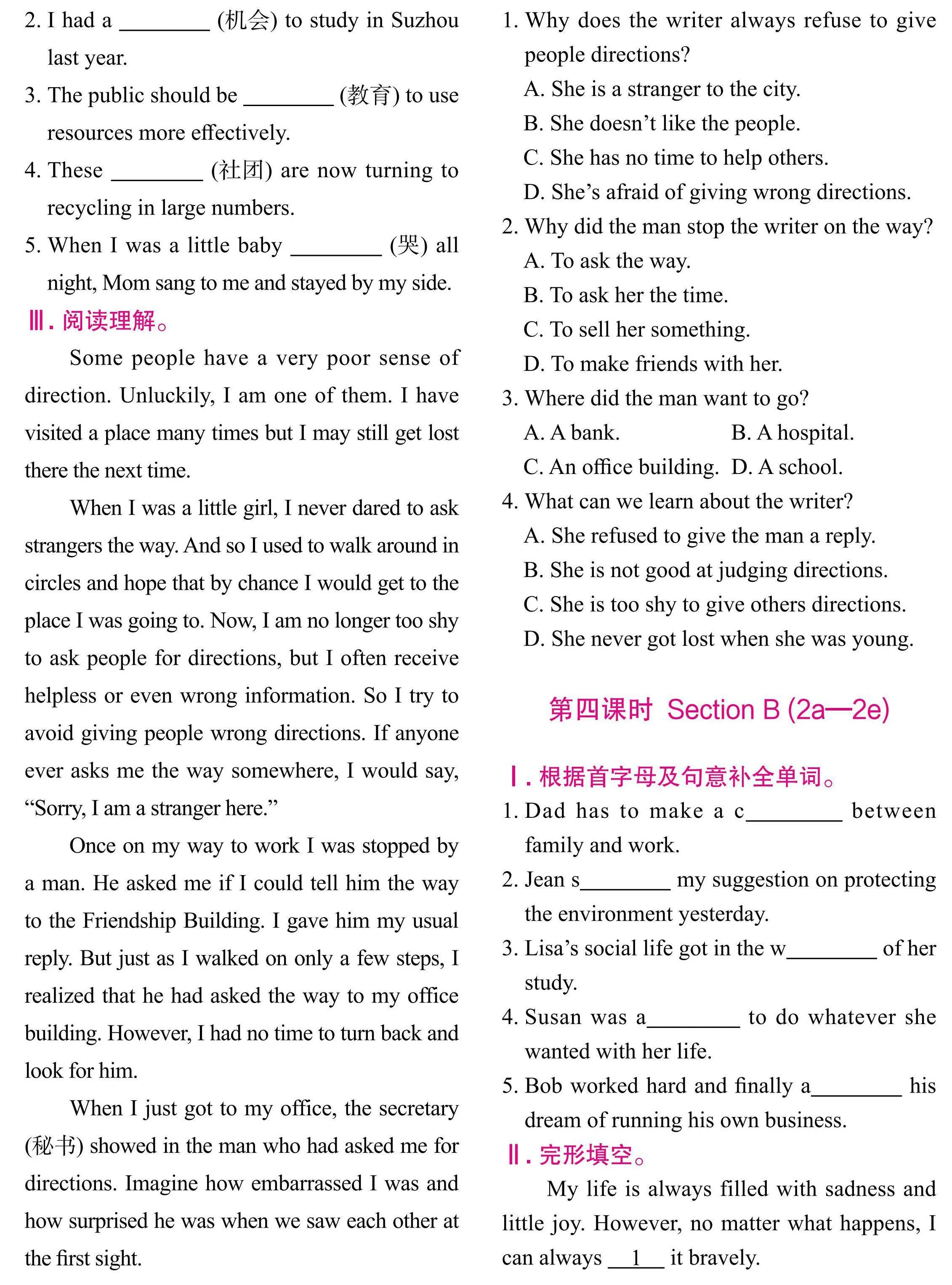
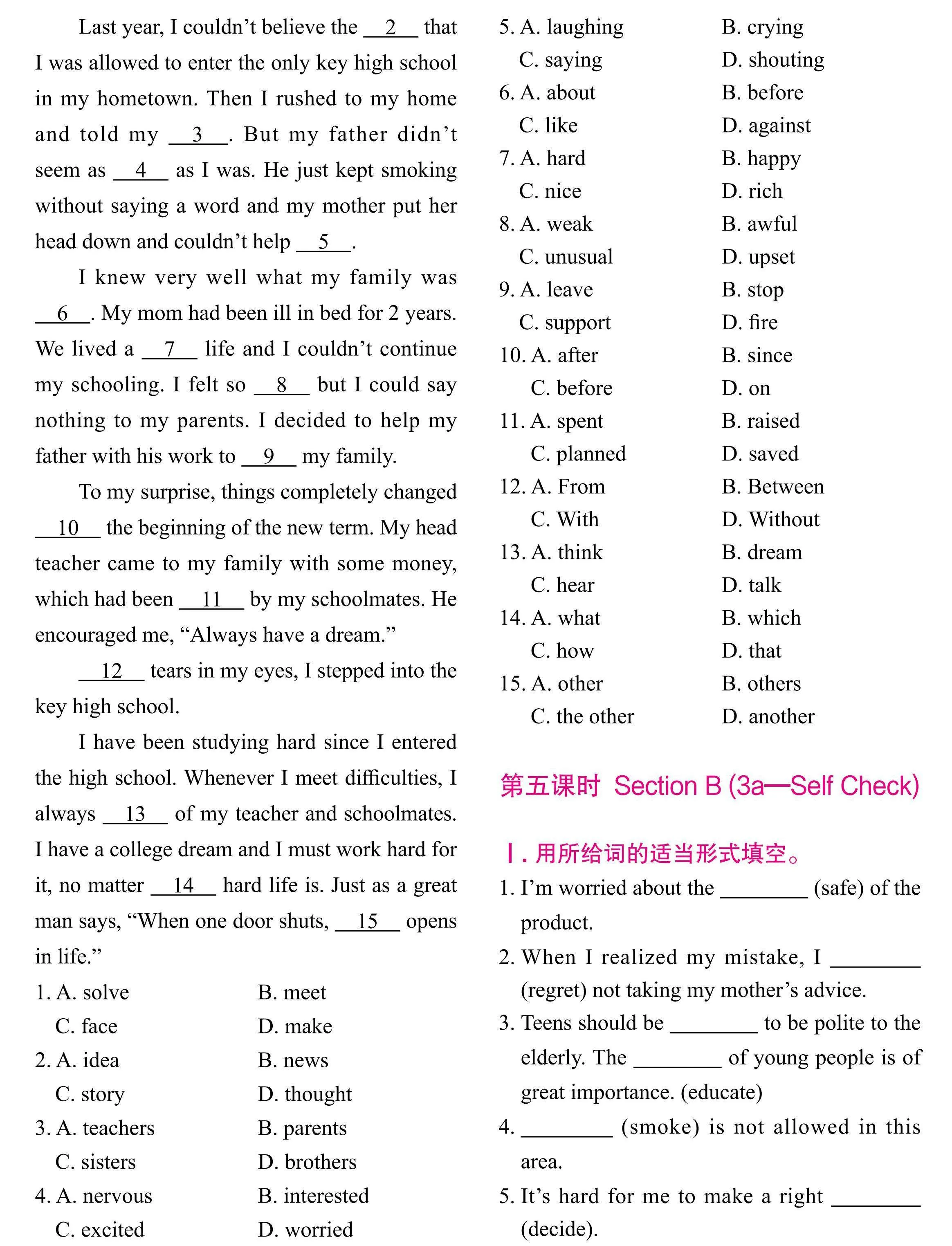
第一课时 Section A (1a—2d)
Ⅰ. 根据首字母及句意补全单词。
1.The young girl planned to find a p job during the summer holiday.
2.For your own s , please fasten your seat belts on the plane.
3.P the skin of the potato with a fork.
4.The policeman asked me to show him my driver’s l .
5.The air was thick with cigarette s .
Ⅱ. 根据汉语意思完成译句。
1. 13岁的少年不应该被允许穿耳洞。
Thirteen-year-olds shouldn’t be
their ears .
2. 他应该停止戴那种耳环。
He those
.
3. 青少年应该被允许选择他们自己的衣服。
Teenagers should
choose their clothes.
4. 为了你和他人的健康,请不要在室内吸烟。
For your and others’ , please do not smoke .
5.16岁的青少年还不够认真,所以不应该允许他们开车。
Sixteen-year-olds aren’t , so they to drive.
Ⅲ. 补全对话(有一项多余)。
A:Jim, you said you would not stay out late after school, didn’t you?
B: 1
A: But it’s 10 o’clock now. 2
B: Sorry. I’ve come to the hospital.
A: What? 3
B: No. I sent Jack to the hospital.
A: Oh, really? What was wrong with him?
B: He had a terrible headache on the way home.
A: 4
B: Yes, he is.
A:Good for you, my dear! I’m very glad you can help others.
B: 5
A. Were you sick?
B. Yes, Mom, I did.
C. Is he better now?
D. Thank you, Mom.
E. What should I do?
F. Where have you been?
1. 2. 3. 4. 5.
Ⅳ. 阅读理解。
Young people and older people do not always agree. They sometimes have different ideas about living, working and playing. But in one special program in New York State, adults and teenagers live together in a friendly way.
Each summer 200 teenagers and 50 adults live together for eight weeks as members of a special work group. Everyone works several hours each day. They do so not just to keep busy but to find meaning and fun in work. Some teenagers work in the forests or on the farms near the village. Some learn to make things like tables and chairs and to build houses. The adults teach them these skills.
There are several free hours each day. Weekends are free, too. During the free hours some of the teenagers learn photo-taking or drawing. Others sit around and talk or sing. Each teenager chooses his own way to pass his free time.
When people live together, they should have rules. In this program the teenagers and the adults make the rules together. If someone breaks a rule, the problem goes before the whole group. They talk about it and ask, “Why did it happen? What should we do about it?”
One of the teenagers has said something about it, “You have to stop thinking only about yourself. You learn how to think about the group.”
1.What can we know about young and older people in the program in New York State?
A. They live together like friends.
B. They learn to build houses.
C. They work hard together.
D. They work for 1 months.
2.What are the group members mainly working for every day?
A. Leading a different life.
B. Learning new skills of farming.
C. Getting used to the life on the farms.
D.Finding useful things and pleasure in work.
3. The group members .
A. don’t have to follow the rules
B. have no free time but on weekends
C. have to follow the rules the adults make
D.shouldn’t break the rules they make together
4.What does the teenager think of the program according to the last paragraph?
A. Pleasant. B. Helpful.
C. Boring. D. Tiring.
5. What can be the best title of the passage?
A. Free Hours in the Special Work Group
B. Teenagers and Adults Together
C. The Rules of Living Together
D. Life in New York State
第二课时 Section A (3a—4c)
Ⅰ. 用方框中所给词(组)的适当形式填空。
keep... away from make one’s own decision
manage regret talk back
1.How could you to your boss like that?
2.Bill talking back, not listening to Mom yesterday.
3.Can’t you respect me enough to let me
?
4.Children should the river.
5.Kate to find an apartment near her office last Sunday.
Ⅱ. 按要求完成句子。
1.Teachers should encourage students to speak out their own thoughts. (改为被动语态)
2.Trees must be planted in spring. (改为一般疑问句)
3.I’d like to answer your question in another way. (用同义词替换画线部分)
4.Students should be taught how to manage their own lives by their parents. (对画线部分提问)
5.I think teenagers should be encouraged to make their own decisions. (改为否定句)
Ⅲ. 完形填空。
Sometimes, children want to grow up quickly. That’s because 1 have no school rules to follow at all and they are allowed to do many things, such as driving cars, moving out, staying out late and so on. But there’s one place in Japan where children want to stay 2 " "forever.
Adults are not allowed to visit Japan’s Future Sweets Factory, which is a magical place full of something sweet and delicious only students in Grade Six and those who are younger are allowed.
Future Sweets Factory is located in Hyogo Prefecture, 3 . After kids pass through the gate, they must say goodbye to their parents. Then they 4 a special kid-size door to the place where all the magic happens. The factory is decorated (装饰) to suit the kids’ 5 with cartoon characters and robots. Inside the factory, kids are treated to taste sweets and they also have a chance to learn how sweets are cooked.
After kids get out, they are encouraged to 6 their exciting adventures (奇遇) to their parents. In fact, this communication between
7 and children was owner Susumu Koyama’s motivation (动机) for starting Future Sweets Factory. “Nowadays, adults are 8 so they don’t spend much time listening to what their children are saying,” he said. “I hope parents will be more 9 about communicating with their kids in daily life.”
Future Sweets Factory is a wonderful idea. It teaches kids to express themselves 10 and gives children an exciting experience to remember. It’s really popular in Japan now.
1. A. babies" " " B. kids
C. teenagers" " " " D. adults
2. A. young" " " B. pretty
C. talented" " " " " D. tall
3. A. China" " " B. Japan
C. Australia" " " " D. France
4. A. go through" B. look through
C. give up" " " " " D. drop by
5. A. positions" " B. tastes
C. ages D. ideas
6. A. send B. remember
C. write D. describe
7. A. parents" " " B. teachers
C. masters" " " " " D. leaders
8. A. silent B. active
C. busy D. clever
9. A. nervous" " " B. serious
C. upset" " " " " D. worried
10. A. slowly" " " B. widely
C. bravely" " " " " D. suddenly
第三课时 Section B (1a—1e)
Ⅰ. 用所给词的适当形式填空。
1.My brother is old enough (join) the army.
2.Adam stood there with his arms (lift) above his head.
3.Jerry told his friends some things he later regretted (tell).
4.The workers (manage) to pull down the old building yesterday.
5.Mr Wilson likes shaking hands with guests instead of (hug) each other.
Ⅱ. 根据汉语提示及句意填写单词。
1.We met Joe and I thought he was (讨厌的).
2.I had a (机会) to study in Suzhou last year.
3.The public should be (教育) to use resources more effectively.
4.These (社团) are now turning to recycling in large numbers.
5.When I was a little baby (哭) all night, Mom sang to me and stayed by my side.
Ⅲ. 阅读理解。
Some people have a very poor sense of direction. Unluckily, I am one of them. I have visited a place many times but I may still get lost there the next time.
When I was a little girl, I never dared to ask strangers the way. And so I used to walk around in circles and hope that by chance I would get to the place I was going to. Now, I am no longer too shy to ask people for directions, but I often receive helpless or even wrong information. So I try to avoid giving people wrong directions. If anyone ever asks me the way somewhere, I would say, “Sorry, I am a stranger here.”
Once on my way to work I was stopped by a man. He asked me if I could tell him the way to the Friendship Building. I gave him my usual reply. But just as I walked on only a few steps, I realized that he had asked the way to my office building. However, I had no time to turn back and look for him.
When I just got to my office, the secretary (秘书) showed in the man who had asked me for directions. Imagine how embarrassed I was and how surprised he was when we saw each other at the first sight.
1.Why does the writer always refuse to give people directions?
A. She is a stranger to the city.
B. She doesn’t like the people.
C. She has no time to help others.
D. She’s afraid of giving wrong directions.
2. Why did the man stop the writer on the way?
A. To ask the way.
B. To ask her the time.
C. To sell her something.
D. To make friends with her.
3. Where did the man want to go?
A. A bank." " B. A hospital.
C. An office building. D. A school.
4. What can we learn about the writer?
A. She refused to give the man a reply.
B. She is not good at judging directions.
C. She is too shy to give others directions.
D. She never got lost when she was young.
第四课时 Section B (2a—2e)
Ⅰ. 根据首字母及句意补全单词。
1.Dad has to make a c between family and work.
2.Jean s my suggestion on protecting the environment yesterday.
3.Lisa’s social life got in the w of her study.
4.Susan was a to do whatever she wanted with her life.
5.Bob worked hard and finally a his dream of running his own business.
Ⅱ. 完形填空。
My life is always filled with sadness and little joy. However, no matter what happens, I can always 1 it bravely.
Last year, I couldn’t believe the 2 that I was allowed to enter the only key high school in my hometown. Then I rushed to my home and told my 3 . But my father didn’t seem as 4 as I was. He just kept smoking without saying a word and my mother put her head down and couldn’t help 5 .
I knew very well what my family was
6 . My mom had been ill in bed for 2 years. We lived a 7 life and I couldn’t continue my schooling. I felt so 8 but I could say nothing to my parents. I decided to help my father with his work to 9 my family.
To my surprise, things completely changed
10 the beginning of the new term. My head teacher came to my family with some money, which had been 11 by my schoolmates. He encouraged me, “Always have a dream.”
12 tears in my eyes, I stepped into the key high school.
I have been studying hard since I entered the high school. Whenever I meet difficulties, I always 13 of my teacher and schoolmates. I have a college dream and I must work hard for it, no matter 14 hard life is. Just as a great man says, “When one door shuts, 15 opens in life.”
1. A. solve B. meet
C. face D. make
2. A. idea B. news
C. story D. thought
3. A. teachers B. parents
C. sisters D. brothers
4. A. nervous B. interested
C. excited D. worried
5. A. laughing B. crying
C. saying D. shouting
6. A. about B. before
C. like D. against
7. A. hard B. happy
C. nice D. rich
8. A. weak B. awful
C. unusual D. upset
9. A. leave B. stop
C. support D. fire
10. A. after B. since
C. before D. on
11. A. spent B. raised
C. planned D. saved
12. A. From B. Between
C. With D. Without
13. A. think B. dream
C. hear D. talk
14. A. what B. which
C. how D. that
15. A. other B. others
C. the other D. another
第五课时 Section B (3a—Self Check)
Ⅰ. 用所给词的适当形式填空。
1.I’m worried about the (safe) of the product.
2.When I realized my mistake, I (regret) not taking my mother’s advice.
3.Teens should be to be polite to the elderly. The of young people is of great importance. (educate)
4. (smoke) is not allowed in this area.
5.It’s hard for me to make a right (decide).
Ⅱ. 选词填空(每词限用一次,有两项多余)。
because drive have help in leave
loud present stop thank till when
One day a young man had to stop his car soon after he started for London 1 he heard a strange noise from the back of his car. He got out and examined the wheels carefully, but as he found nothing wrong, he went on. The noise began at once and now it was even 2 . He turned his head and saw something that looked like a big, dark cloud following his car. When he 3 at a village, he was told that a queen bee (蜂王) must be somewhere 4 his car as there were thousands of bees around.
To get away from the bees, the man
5 away quickly and after some time arrived in London. He 6 his car outside a house and went in to have a drink. 7 a door keeper hurried in to tell him that his car was covered with bees, the poor young man 8 to telephone a policeman and told him what had happened. The policeman soon sent him a bee-keeper, who found the passenger, a queen bee, near the wheels. He was very 9 to the young man for his 10 . He took the bees home in a box. The young man drove away happily.
1. 2. 3. 4.
5. 6. 7. 8.
9. 10.
Ⅲ. 阅读六选五。
Tom Smith was a writer. He wrote detective (侦探) stories for magazines. One evening he could not find an end for a story. He sat with his pen in front of him. 1 So he decided to go to the cinema.
2 The man had a drink, smoked several of Tom’s cigarettes and read the story. The man left a note, “I have read your story and I don’t think much of it. 3 By the way, I am a thief. I am not going to steal anything tonight. But if you become a famous writer, I will return.”
4 Then he sat down and finished the story. 5 But when he goes out in the evening, he always leaves a half-finished story on his desk.
A. But he had no idea.
B. Tom is famous now.
C. Tom read the thief’s advice.
D. Tom is still not a famous writer.
E.He found someone had broken into his house when he came back.
F.Please read my advice and you can write a wonderful story.
1. 2. 3. 4. 5.
Ⅳ. 书面表达。
俗话说:“无规矩不成方圆。”请你以“My Opinions on Family Rules”为题,谈谈你家的家规以及你对家规的看法。
注意:
词数90左右。
My Opinions on Family Rules
